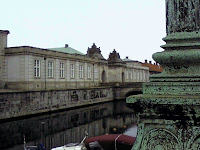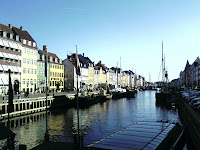that's me...

...just to give you a first impression of what I look like. I'll add some more pictures soon.
Saturday, February 23, 2008
op ewig ungedelt...
Jørn's second interest was to show how history can be used to avoid conflicts and to prevent people to slip up like their ancestors. For me - born and grown up in a peaceful region - it was important to learn that even in my homeland Schleswig-Holstein times were not always like these.
Friday, February 22, 2008
Danish school life...
We started our third week on Monday with a recapitulation of our school visits during the first week. We collected the results of our observations and tried to make up generalized predications about the Danish school system. The keywords we listed were: freedom, feeling like at home, few rules, well equiped schools, many different ways to learn, little structure. Afterwards our teacher Torbjørn Ydegård tried to explain the reasons for certain aspects and provided us an insight into the Danish educational system. For example we talked about problematic pupils, the hidden curriculum and private schools. Torbjørn explained to us the importance of the work of Michel Foucault (e.g. "Discipline & Punish: The birth of the prison") for the Danish school system. "Michel Foucault is best known for his critical studies of various social intitutions, most notably psychiatry, medicine, the human sciences, and the prison system [which he related to the educational system], as well as for his work on the history of human sexuality. Foucault's work on power, and the relationships among power, knowledge, and discourse, has been widely discussed and applied." ( http://en.wikipedia.org/wiki/Michel_Foucault )
The second discussion topic was related to our observation of lacking structure in the lessons. We were introduced to the so called "hidden curriculum" which is quite important for Danish teachers. The focus is more on achieving learning strategies and competences than on data knowledge in the subjects. The idea was not new to me because I learned something similar in Germany. We call it "educational standards", "curriculum framework" or "key competences". What these concepts have in common is the increased importance of skills and competences in addition to knowledge in the subjects.
Torbjørn concluded our excursion to the Danish educational system with a short presentation about Danish private schools. The most striking aspect here was the possibility for parents to found a private school with - compared to our countries - little obligations. Another important point was the form of financing: Private schools get their benefits directly from the government whereas public schools are paid by the communities.
On Tuesday we continued our discussion about school systems with Torbjørn. He started off with presenting us two theoretical approaches concerning education: the interconnected didactical categories (ability, framework, aims and goals, content, methods, evaluation) are often refered to in the Danish educational system. The main focus is on the abilities the pupils should develop in school. It is often connected to Immanuel Kant ("All the preparations of reason, therefore, in what may be called pure philosophy, are in reality directed to those three problems only [God, the soul, and freedom]. However, these three elements in themselves still hold independent, proportional, objective weight individually. Moreover, in a collective relational context; namely, to know what ought to be done: if the will is free, if there is a God, and if there is a future world. As this concerns our actions with reference to the highest aims of life, we see that the ultimate intention of nature in her wise provision was really, in the constitution of our reason, directed to moral interests only."(Critique of pure reason, 1781)) and emphasizes the importance of using your reason.
This theory was also part of the approach by the German Wolfgang Klafki. Klafki furnished the term "Bildung" as related to autonomy (individual-related) and democracy / solidarity (society-related). In his approach the main focus in education is on the aims and goals.
The second theory by the Norwegian Erik J. Dale extracts the role of the teacher from the network of didactical categories. It focuses on the competences of teachers and classifies three categories: C1: the teacher standing in front of the class, C2: the teacher thinking about teaching / planing the lessons, C3: the teacher communicating about didactics / developing theories. According to Dale unfortunately most teachers remain stuck in the first two categories. He assumes that teachers lose their autonomy without participating in C3. Furthermore he advises against the potential danger of centralized top to bottom regulations of schools by the government.
The remaining time we prepared our next school excursion in pairs. I worked together with Charlotte and we decided to split up our observation interests into pupil's and teacher's actions and behaviour.
In conclusion I would say that I learned a lot about the differences in the educational systems of Denmark and Germany (or at least Schleswig-Holstein). Especially I appreciated the reference to Klafki whose approaches are often refered to in my home university. Thus I could recapitulate my knowledge and add new aspects about educational theories.
Tuesday, February 19, 2008
meet the mermaid...
 impossible for me to note down all my impressions and sensations without writing for the rest of the day. So to keep it short and clear I will just list the places and sights we (I) have been to and expand this list with a few keywords about feelings and impressions. It's just a short overview.
impossible for me to note down all my impressions and sensations without writing for the rest of the day. So to keep it short and clear I will just list the places and sights we (I) have been to and expand this list with a few keywords about feelings and impressions. It's just a short overview.Main station: awing, wooden arch, capacious
Tourist information: informative, enlightening
Hostel: poky rooms, clean bathroom, nice bar
"Black diamond": extraterrestrial,
 architectural blending, interesting
architectural blending, interestingNyhavn: retro chic, cozy quarter, gaudy
Christiansborg: being renovated, pallid, unspectacular
National museum: sizable, for free, diversified
Opera: spacy, large, modern
Kastellet: disappointing, dull
Little mermaid: photogenic, pleasant company, cute
National art museum: extravagant, trivial modern "art", impressive paintings
Rosenborg castle: dreamy, squiggled, romantic
RizRaz: satiating, delicious, varied

Town hall square: crowded, loud
Town hall: presentable, ample
University: phenomenal, richly adorned
St. Petri Kirke: closed, elegant appearance
Helligandskirken: colourful, plentyful ornated gallery
Vor Frue Kirke: detailed crafted statues, coolish
Marmorkirken: mind-blowing, amazing
Amalienborg: clean, organized, pretty
Christiania: alternatively, complementary world, twilight atmosphere